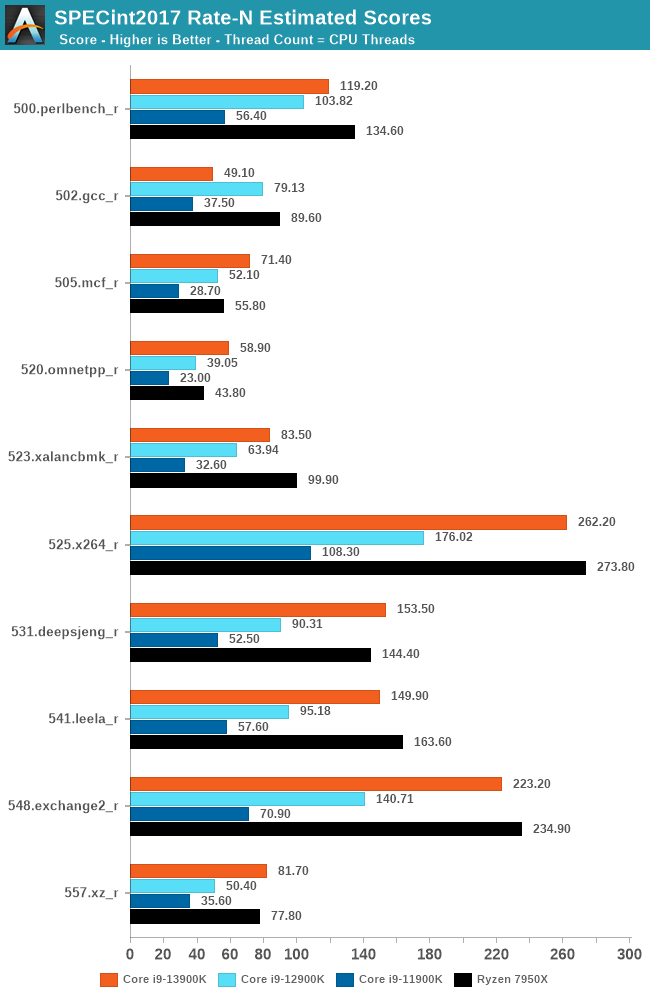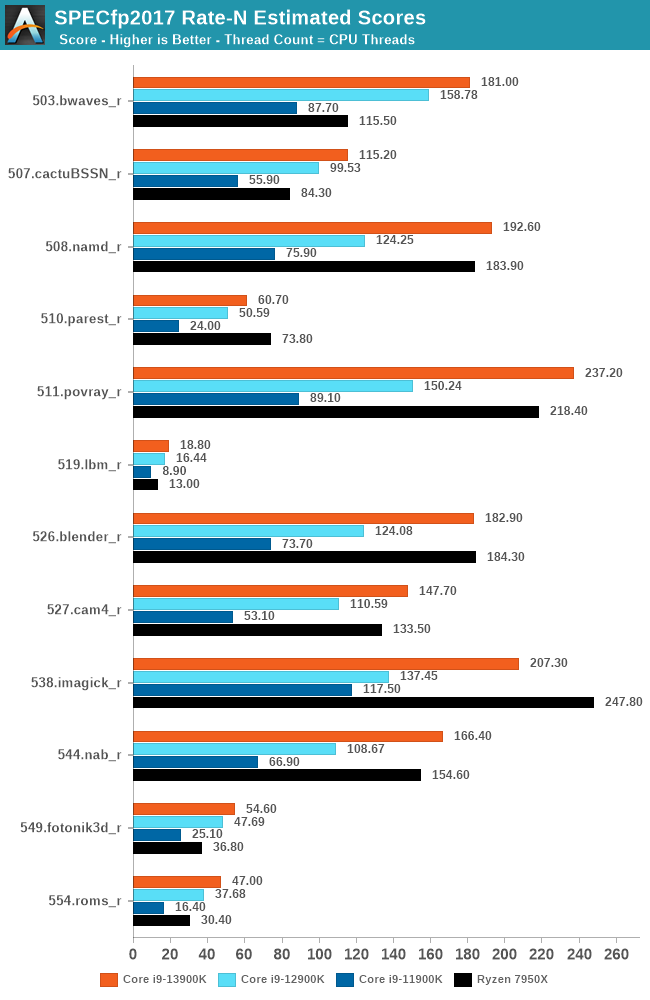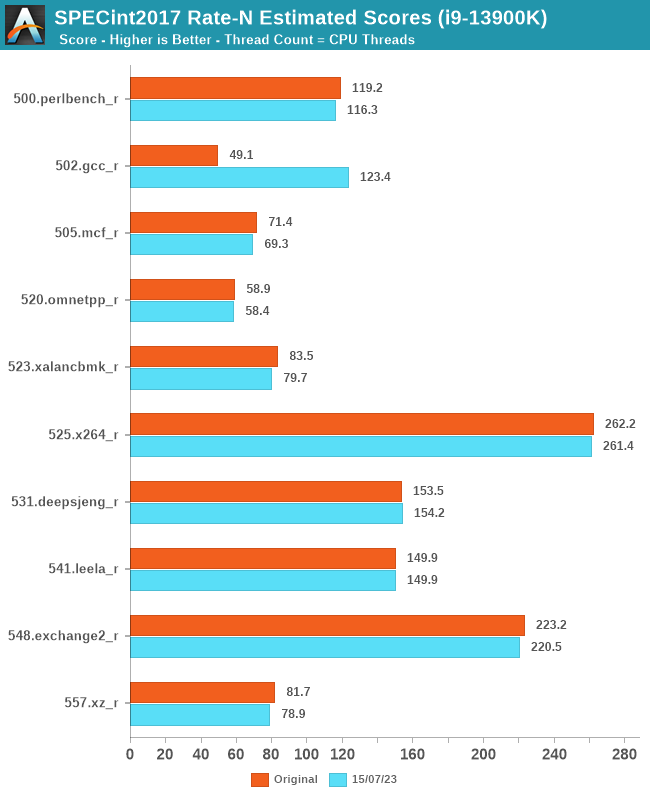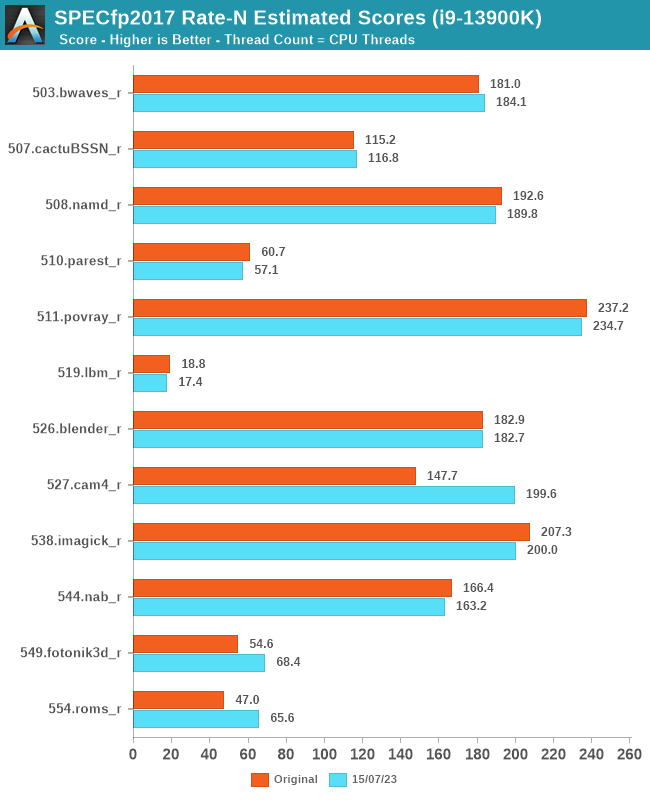Intel Core i9-13900K and i5-13600K Review: Raptor Lake Brings More Bite
by Gavin Bonshor on October 20, 2022 9:00 AM ESTSPEC2017 Multi-Threaded Results
Single-threaded performance is only one element in regard to performance on a multi-core processor, and it's time to look at multi-threaded performance in SPEC2017. Although things in the single-threaded SPEC2017 testing showed that both Zen 4 and Raptor Lake were consistently at loggerheads, let's look at data in the Rate-N multi-threaded section.

Looking at the data in our first part of SPEC2017 (int) nT testing, we're seeing similar trade-offs between Raptor Lake (13th Gen) and Zen 4 (Ryzen 7000) platforms. While Raptor Lake won in the 500.perlbench_r single-threaded test, Zen 4 has the lead by around 13% in multi-threaded performance, despite the Core i9-13900K having eight more physical cores (albeit efficiency cores).
One stand-out part of our SPECint2017 multi-threaded testing is just how far ahead the Core i9-13900K is ahead of the previous Core i9-12900K in multi-threaded tests. This comes thanks to more cores (2x the E-cores), and higher turbo frequencies. For example, in the 525.x264_r test, the Core i9-13900K is nearly 50% better than the i9-12900K; the only part where Raptor Lake failed to outperform Alder Lake was in the 502.gc_r test.

Moving onto the second half of our SPEC2017 multi-threaded results (Floating Point), the Core i9-13900K really does show itself to be a formidable force compared to Zen 4. In the majority of SPECfp2017 tests, the Core i9-13900K is ahead in multi-threaded performance. The improvements in overall performance from Rocket Lake (11th Gen) to Alder Lake were decent, but the improvement from Rocket Lake last year in Q1 2021 to Raptor Lake today – a more useful metric for the usual 2-4 year hardware upgrade cycle – is very impressive indeed.
Summarizing the SPEC2017 multi-threaded results, in some areas Zen 4 is the winner, some areas Raptor Lake (Raptor Cove + Gracemont) is the winner. It is incredibly close in quite a few of the tests, and without sounding negative on the Zen 4 architecture here, but Intel has done a very good job bridging that initial gap to make things competitive against AMD's best.
Update 18/07/23
Following on from our initial results in our SPECint2017 Rate multi-threaded testing of the Core i9-13900K, we wanted to investigate the 502.gcc_r result, which we believed to be an anomaly of sorts. We observed a score of 49.1 on the Core i9-13900K, which, compared to the previous generation Core i9-12900K, is a regression in performance; the result was around 37% lower than the previous generation.
To investigate further, we've re-tested the Core i9-13900K using SPEC2017 Rate to identify any issues and to see if we could further replicate the issue or, at the very least, provide a more up-to-date list of results.

Looking at our updated SPECin2017 results, we are comparing the original Core i9-13900K data to the new data for comparative purposes. Although the results are very similar in many cases, we can see some slight regression in a few results, which could be attributed to various factors, including Windows 11's scheduler, power budget, or just general variance in running.
The biggest highlight of our re-test is the 502.gcc_r result, which seems to be an anomaly for the original run. We've run SPEC2017 numerous times to confirm that the above results are exactly where they should be.

Focusing on our latest results for SPECfp2017 Rate N, we can see a similar story, with very similar results in multi-threaded SPEC2017 performance as with our original testing. In fact, a couple of the results yielded slightly higher results, which could be simply down to scheduler maturity, OS-related improvements including the scheduler, or overall firmware maturity. The results include 527.cam4_r, 549.fotonik3d_r, and 554.roms_r, which show better gains in our latest testing, especially compared to the Core i9-12900K, which this chip replaced in the market.
The biggest takeaway from our re-testing is the updated SPECint2017 Rate-N result for 502.gcc_r, which shows that our original results were nothing more than an anomaly, and we've been unable to replicate the issue.
Update: 07/22/23
We are aware of potential issues with memory capacity, and as such, we are re-running the Core i9-13900K with higher capacity DDR5 memory at JEDEC settings relevant to the platform. We have done a run with 64 GB instead of the regular 32 GB, which with the Core i9-13900K is 2 GB per thread (2 GB x 32 = 64 GB). Looking at preliminary results, we aren't seeing any major variances in these results.










169 Comments
View All Comments
nandnandnand - Thursday, October 20, 2022 - link
The 7950X outperforms the 13900K from 65W to 185W by substantial amounts: https://www.youtube.com/watch?v=P40gp_DJk5E (19:00, Cinebench R23 multi)It also seems to use less power at lower temps in gaming (23:00, Cyberpunk 2077)
That's probably not the end of the story, but Zen 4 is clearly doing better out of the box. Good news for Dragon Range buyers in 2023. Reply
Harry_Wild - Thursday, October 20, 2022 - link
Very happy that Raptor Lake is super competitive to AMD 7000 series! AMD has to lower it’s high end pricing now for both it’s chipset and retail pricing. Let the price wars begin after Thanksgivings. I expect the 7050X to go from $699 to $499. X670E boards will be the same price as the Intel equivalent models! 😁👍 ReplyDrazick - Thursday, October 20, 2022 - link
Could you build / compiler the SPEC tests with AVX512 flags for the Ryzen 7xxx? ReplyRyan Smith - Thursday, October 20, 2022 - link
It's on the to-do list. Though we're not expecting a significant change in performance. ReplyKangal - Thursday, October 20, 2022 - link
Any plans to test these in thermally or energy-constrained limits? Like with Air Cooling, or certain Watt limits?Or perhaps, how will Zen4 on laptops compare to Intel's RPL-equivalent on laptops...?
From here it looks similar to Zen3 vs Intel 12th, or Zen2 vs Intel 11th. That AMD is competitive in multithread and better efficiency, and Intel only remains competitive by expending alot of power, and it's mostly for the single-core.
Reply
Ryan Smith - Friday, October 21, 2022 - link
Yes. Performance testing at lower power levels is also on the to-do list. We had a chance to play with eco mode a bit for the Ryzen review, but didn't get to do something similar for Raptor Lake. ReplyKangal - Friday, October 21, 2022 - link
Oh nice, will be waiting for that next article to drop. Cheers!Reply
m53 - Friday, October 21, 2022 - link
@Ryan: How about testing idle power and realistic day-to-day use cases? I can only find this kind of review for 12th gen vs Zen3 and not 13th gen vs zen4. Would be really nice to have the numbers for 13th zen vs zen4.Here is a link to the review for 12th gen vs zen3: https://youtu.be/4F2z3F64o94 Reply
Drazick - Friday, October 21, 2022 - link
@Ryan, I am not sure about it.I think enabling AVX512 on Ryzen will have a great effect on the FP tests of SPEC. Reply
Oxford Guy - Friday, October 28, 2022 - link
There wasn’t a delay when one of the rendering apps got AVX-512 support several years ago. Reply